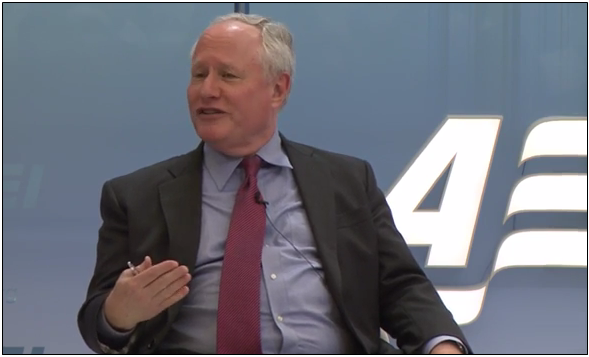“Look, to be totally honest, if things are so bad as you say with the white working class, don’t you want to get new Americans in?”
That was the Weekly Standard’s Bill Kristol responding to a call by the American Enterprise Institute’s Charles Murray for a decrease in low-skilled immigration at a Feb. 7 event discussing Murray’s book “Coming Apart,” which notes the risks of the divergence of lifestyles between rich and poor Americans.
Kristol continued, “You can make a case that America has been great because every — I think John Adams said this — basically if you are in free society, a capitalist society, after two or three generations of hard work everyone becomes kind of decadent, lazy, spoiled — whatever. Then, luckily, you have these waves of people coming in from Italy, Ireland, Russia, and now Mexico, who really want to work hard and really want to succeed and really want their kids to live better lives than them and aren’t sort of clipping coupons or hoping that they can hang on and meanwhile grew up as spoiled kids and so forth. In that respect, I don’t know how this moment is that different from the early 20th century.”
For those still trying to figure out why President Donald Trump won the election, Kristol’s remarks somewhat stand out as Exhibit A. Maybe the American people have had enough with elites kicking them in the head.
Truth be told, I’m not sure I buy the narrative that folks have suddenly become lazy.
Labor participation among 16-64 year olds peaked in 1997 and has been in decline for two straight decades. A combination of younger Americans taking longer to enter the labor force or just not entering, and then the huge contraction that happened after the 2008-09 recession that has not recovered.
But since the turn of the century, about 9 million 16-64 year olds have become displaced out of the workforce, either leaving the labor force or not entering on a net basis, reflected in the marked drop of labor participation.
Well, perhaps the reason they are not looking for work is because there are comparatively fewer jobs available. This is not a lack of virtue. It’s a lack of opportunity.
Over that same period, the GDP has not grown above 4 percent since 2000 and not above 3 percent since 2005. 2007 to 2016 was the slowest 10-year period for growth ever — even worse than 1930 to 1939. The past ten years had even slower average annual growth than the Great Depression.
The reason folks will rightly be angry with Kristol, or Kevin Williamson’s ill-advised assertion last year that white working class communities deserve to die, is because there is something seriously wrong with these trends. And it has little to do with the American people’s work ethic, as if crappy growth, lack of job creation, flat incomes, etc. was some sort of moral failing on the part of the American people.
Perhaps these declines are the result of the policy choices made by government — on taxes, trade and regulation — that have made it more cost-effective to do produce things elsewhere.
Kristol in the same talk heralded globalization as having lifted hundreds of millions of people out of poverty — overseas. Well, good for them, I suppose. In the meantime, millions of Americans are asking, what about us?
Overall, the idea that outsourcing and globalization have not been anything but positive, dynamic impacts on the U.S. economy has been treated as heresy by elites to the extent that they have now come up with fallacies that blame the victims of those trends. They’re lazy and need to be replaced.
Murray for his part looks at the same set of challenges and concludes that there’s no way back in the U.S., that jobs will not be the answer for millions of Americans being dislocated in the current economy and who will become dislocated.
Murray at the talk renewed his call for “universal basic income,” the idea of guaranteed income for all Americans to replace the welfare state, because as automation becomes more prevalent, millions of more jobs will be lost, a haunting prospect.
So, there were at least two elite visions both for replacing the American working class, one with immigrants and the other, with machines and welfare.
With such undesirable choices, then, perhaps it is unsurprising that the American people voted for Trump, who promised them something a bit more appealing: Jobs. A way to sustain their families that has worked for millennia.
Trump has pointed to outsourcing as the reason for the decline, and has promised to shift production back to the U.S. To the extent that succeeds or fails in creating an environment that fosters robust economic growth and job creation may tell us which path we took at this crossroads we find ourselves.
One thing is clear, based on the rise of Trump and how the nation voted in 2016, the American people don’t believe they need to be replaced, either by immigrants or machines, they just want an opportunity to do for themselves to sustain themselves — that inherent human nature that cannot be denied for too long without resulting in significant pushback. Time will tell if Trump had the answer for them or not.
Robert Romano is the senior editor of Americans for Limited Government.







